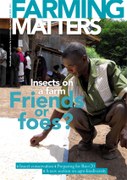Deadline: June 1st, 2012
All over the world farmers work together, in both formal and informal settings. Collective action can help farmers to have their voices heard in the political and commercial arena, to minimise risks, to strengthen their capacities and to secure property rights – all extremely challenging things for individuals to achieve working alone.
By grouping together, farmers can build strong track records which can help them obtain financial support. Farmers’ organisations can be instrumental in buying, selling or processing agricultural products in bulk – and they can do this in a sustainable way.
Farmers’ organisations can play important roles in developing supply management schemes and various income insurance programmes. Farmers can learn from each other, about production, marketing, rights, etc., and join a platform to learn about others’ experiences.
As a group, farmers can exercise more political pressure for change. Yet, even though there are many potential benefits for small-scale farmers who become organised, the logistics and governance of farming organisations can be problematic. Farmer organisations do not automatically benefit everyone in the community: are they, for example, open to everyone, including female farmers?
The UN has declared 2012 the International Year of Co-operatives – a common type of farmers’ organisation. Farming Matters will also pay special attention to farmers’ organisations in the September issue. In what different ways do farmers organise? What problems exist in farmers’ organisations and how are these dealt with?
Please visit our website and leave your suggestions, comments and ideas on articles for this issue. Articles for the September issue of Farming Matters should be sent to Jorge Chavez-Tafur (j.chavez-tafur@ileia.org), editor, before June 1st, 2012.

